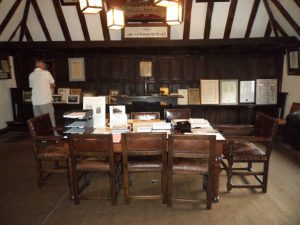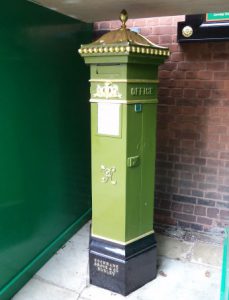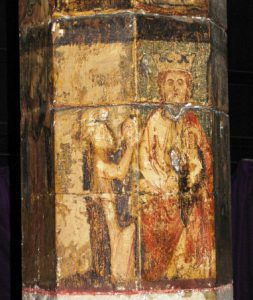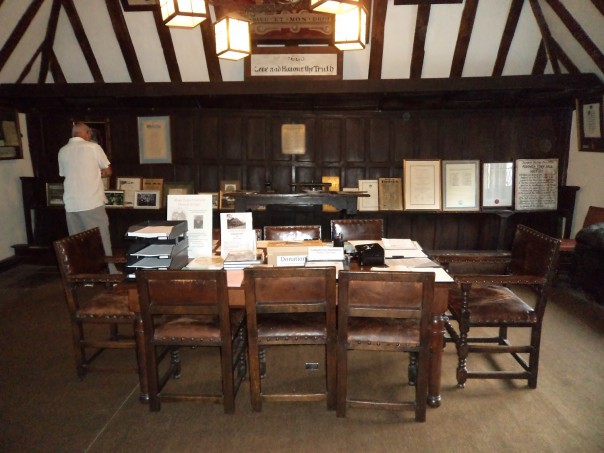I thought that this week and next would follow the example of the Roman god Janus and look back this week and forward next week into 2017. Consequently, the blog today will offer a brief summary of events organised or involving the Centre during 2016 to provide a flavour of the types of activities various members undertook under the Centre’s head, Professor Jackie Eales. However, before moving on to specifics, it is worth recording that over the year several historians: Drs John Bulaitis, Diane Heath, Lesley Hardy, Martin Watts and I went out to give talks to local history societies and other similar organisations in Kent. This type of engagement with those beyond the confines of academia is exceedingly valuable for both sides and can lead to further collaboration and even partnerships to undertake research projects.

To turn to the Centre’s events, the most ambitious of these was the ‘Canterbury Medieval Weekend’, which was a collaborative undertaking with the Canterbury Cathedral Archives and Library, the organisers from the Centre being Professor Louise Wilkinson, Diane Heath and me. The twenty-two events ran from the evening of Friday 1 April to late afternoon on Sunday 2 April comprising lectures and guided tours of iconic medieval buildings and the cathedral library. The varied lectures were given by leading academics and more ‘popular’ historians under five themes, thereby allowing those attending to ‘pick-and-mix’ what they wished to attend. This format proved to be exceedingly popular with the public and attracted people from as far away as Cornwall and Newcastle, as well as many from south-east England and London. In total over 1500 tickets were sold and at times there were well over 300 people present. The CCCU bookstall was also very popular. Questionnaire responses confirmed the success of the Weekend.
Although it was impossible to predict how successful the Weekend would be, the intention of the organisers was to try to create a surplus that could be allocated: a) to the establishment of the Ian Coulson Memorial Postgraduate Award to help postgraduates working on Kent research topics for a higher degree at CCCU; and b) to give donations to the medieval buildings visited as part of the Weekend. The organisers wanted to honour Ian in this way because of his major contribution to the study of history in Kent, and his involvement with Canterbury Christ Church, especially through the HLF-funded Folkestone project ‘A Town Unearthed’. Before the Weekend, the organisers had successfully acquired sponsorship from outside the university: Friends of Canterbury Archaeological Trust, The William and Edith Oldham Charitable Trust, Kent Archaeological Society and Peter Hobbs; as well as a similar sum from a CCCU Faculty Knowledge Exchange Award. Due to higher than expected ticket sales, the final surplus was about £12,000, of which donations of £1000 each were given to the four buildings. Of the remainder, in total £4000 was allocated equally to five postgraduate award winners in August (2 Masters students; 3 doctoral students), and the rest is now in a fund specifically for these postgraduate awards. Moreover, this fund is already growing because Centre events have added further surpluses this autumn (see below). A postgraduate poster competition on ‘Making Medieval Research Accessible’ was judged by attendees at the Weekend, the winner coming from the University of Nottingham, the runner-up from the University of Birmingham. More on all of this can be seen on the Centre’s webpages, and Matthew Crockatt continues to do a brilliant job on this expanding site.
In June, the Centre held a 1-day conference on ‘Richborough through the Ages’ led by Martin Watts. Although not a joint event, half the speakers came from outside CCCU, and included two well-known Kent archaeologists. Having acquired a large email circulation list as a product of the Medieval Weekend, the catchment area for Centre events has extended considerably and there was at least one person from Wiltshire at this conference. Over 100 people (staff, students, members of the public) attended and the audience was enthusiastic throughout the day.

Appealing to a far younger audience was the Centre’s contribution to the Medieval Pageant in July. Based at Canterbury Castle, Louise Wilkinson led a team of CCCU Humanities academic staff and student volunteers who provided families with the opportunity to hear talks about castle life and Middle-English literature, and take part in child-friendly activities. The venue proved to be exceedingly popular and over 850 people came to the Centre’s stall, as well as seeing the reenactors who were camped in the castle grounds. The student helpers have made an excellent contribution to all the Centre’s events, which has been good for the public face of the university, and the Centre in particular. Hopefully, they are enjoyed the experience and gained skills that should be useful in their future careers.
To mark the publication of the last volume in the Kent History Project series Early Medieval Kent, 800–1220, a conference under the same title took place on Saturday 10 September. This joint event with the Friends of Canterbury Archaeological Trust [FCAT] attracted over 150 people who heard eight talks under the themes of ‘Raiders, Invaders and Settlers’; ‘Aspects of Landscape’; ‘The Church’, and ‘The City of Canterbury’. The speakers drew on the material in their respective chapters, as well as extending their analysis on occasion. The CCCU bookstall sold all the copies it had of Early Medieval Kent, and CAT, the Kent Archives Service and BALH also had stalls. Like the Richborough conference, this too generated a surplus that has been added to the Ian Coulson Memorial fund.
For the second year running, the Centre hosted the Nightingale Memorial Lecture jointly with the Agricultural Museum, Brook. In September, the speaker was Professor John Martin of De Montfort University who spoke on ‘Wartime Farm Revisited’. The audience comprised staff, students, Museum Trustees and members of the public who showed their appreciation by the number and range of questions posed to Professor Martin. Before the lecture, Dr Keith McLay, as Dean of the Faculty of Arts and Humanities, awarded prizes to several of the Ian Coulson Memorial Postgraduate Award winners and from the collection taken afterwards a further £100 has gone to the fund.

The KAS Place-Names Committee and the Centre held a joint conference on Saturday 12 November under the title ‘Kent Places and People’. Eighty-five people attended, where they heard two lectures by Dr Paul Cullen on field names and relational names. Other speakers included Dr Mike Bintley (CCCU) and Elizabeth Finn of the Kent Archives service who spoke on the ‘Kent Manorial Records’ project which she is currently undertaking.
On Tuesday 6 December, to mark the relaunch of the Centre – a new name and home in the Faculty of Arts and Humanities, and Louise Wilkinson joined Jackie to lead it into 2017 – Paul Bennett, as the Centre’s Visiting Professor, gave his inaugural professorial lecture. As many of you will know he is the Director of Canterbury Archaeological Trust and thus it was hardly surprising that he spoke on ‘From Benghazi to Canterbury: An Archaeologist’s Tale’. A large audience comprising university staff, members from the Trust and people from Canterbury, east Kent and beyond heard Paul talk about his early career, his life-long passion for archaeology and his conviction that understanding our past matters – whether this is classical antiquity or recent industrial heritage.
Finally, it is worth mentioning that I joined Dr Ben Marsh (School of History, University of Kent) on Wednesday 16 November to give one of the presentations to local sixth-form students and members of the U3A as part of his outreach initiative called Kent’s People’s History. Louise Wilkinson and several of her colleagues have been active at various Canterbury Historical Association branch events, including those involving schools. In addition, Lesley Hardy and Mike Bintley have been working together with the community in Folkestone on a project called ‘Finding Eanswythe’ – more on this next week. As those of you who regularly read this blog will know, it has been coming out weekly over the last twelve months. These posts have reported on Centre and other university history events, as well as on other local history and archaeology lectures to provide a reservoir of knowledge about Canterbury and Kent’s history. Blog readers come from all over the world, and Matthew’s webpages for the Centre have also proved to be popular inside and outside the university, offering a legacy of the Centre’s growing portfolio of activities.
 Centre for Kent History and Heritage
Centre for Kent History and Heritage Sheila Sweetinburgh
Sheila Sweetinburgh 852
852


